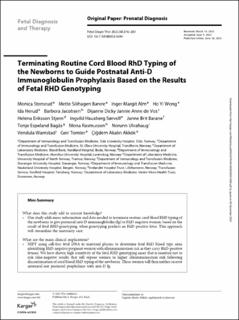| dc.contributor.author | Stensrud, Monica | |
| dc.contributor.author | Silihagen Bævre, Mette | |
| dc.contributor.author | Alm, Inger Margit | |
| dc.contributor.author | Wong, Ho Yi | |
| dc.contributor.author | Herud, Ida | |
| dc.contributor.author | Jacobsen, Barbora | |
| dc.contributor.author | de Vos, Dijanne DickyJannie Anne | |
| dc.contributor.author | Stjern, Helena Eriksson | |
| dc.contributor.author | Sørvoll, Ingvild Hausberg | |
| dc.contributor.author | Barane, Janne Brit | |
| dc.contributor.author | Bagås, Tonje Espeland | |
| dc.contributor.author | Rasmussen, Mona | |
| dc.contributor.author | Ulvahaug, Aud Norunn | |
| dc.contributor.author | Wamstad, Vendula | |
| dc.contributor.author | Tomter, Geir | |
| dc.contributor.author | Akkøk, Cigdem Ahaein | |
| dc.date.accessioned | 2024-02-01T15:06:17Z | |
| dc.date.available | 2024-02-01T15:06:17Z | |
| dc.date.created | 2023-10-11T09:49:20Z | |
| dc.date.issued | 2023 | |
| dc.identifier.citation | Fetal Diagnosis and Therapy. 2023, 50 (4), 276-281. | en_US |
| dc.identifier.issn | 1015-3837 | |
| dc.identifier.uri | https://hdl.handle.net/11250/3115133 | |
| dc.description.abstract | Introduction: Targeted routine antenatal prophylaxis with anti-D immunoglobulin (Ig) only to RhD-negative pregnant women who carry RhD-positive fetuses (determined by fetal RHD genotyping) has reduced D-alloimmunization significantly when administered in addition to postnatal prophylaxis. Achieving high analysis sensitivity and few false-negative fetal RHD results will make RhD typing of the newborn redundant. Postnatal prophylaxis can then be given based on the result of fetal RHD genotyping. Terminating routine RhD typing of the newborns in cord blood will streamline maternity care. Accordingly, we compared the results of fetal RHD genotyping with RhD typing of the newborns. Methods: Fetal RHD genotyping was performed, and antenatal anti-D Ig was administered at gestational week 24 and 28, respectively. Data for 2017–2020 are reported. Results: Ten laboratories reported 18,536 fetal RHD genotypings, and 16,378 RhD typing results of newborns. We found 46 false-positive (0.28%) and seven false-negative (0.04%) results. Sensitivity of the assays was 99.93%, while specificity was 99.24%. Conclusion: Few false-negative results support the good analysis quality of fetal RHD genotyping. Routine cord blood RhD typing will therefore be discontinued nationwide and postnatal anti-D Ig will now be given based on the result of fetal RHD genotyping. | en_US |
| dc.language.iso | eng | en_US |
| dc.publisher | Karger | en_US |
| dc.relation.uri | https://karger.com/fdt/article/50/4/276/853828/Terminating-Routine-Cord-Blood-RhD-Typing-of-the | |
| dc.rights | Navngivelse-Ikkekommersiell 4.0 Internasjonal | * |
| dc.rights.uri | http://creativecommons.org/licenses/by-nc/4.0/deed.no | * |
| dc.title | Terminating Routine Cord Blood RhD Typing of the Newborns to Guide Postnatal Anti-D Immunoglobulin Prophylaxis Based on the Results of Fetal RHD Genotyping | en_US |
| dc.title.alternative | Terminating Routine Cord Blood RhD Typing of the Newborns to Guide Postnatal Anti-D Immunoglobulin Prophylaxis Based on the Results of Fetal RHD Genotyping | en_US |
| dc.type | Peer reviewed | en_US |
| dc.type | Journal article | en_US |
| dc.description.version | publishedVersion | en_US |
| dc.source.pagenumber | 276-281 | en_US |
| dc.source.volume | 50 | en_US |
| dc.source.journal | Fetal Diagnosis and Therapy | en_US |
| dc.source.issue | 4 | en_US |
| dc.identifier.doi | 10.1159/000531694 | |
| dc.identifier.cristin | 2183596 | |
| cristin.ispublished | true | |
| cristin.fulltext | original | |
| cristin.qualitycode | 1 | |

